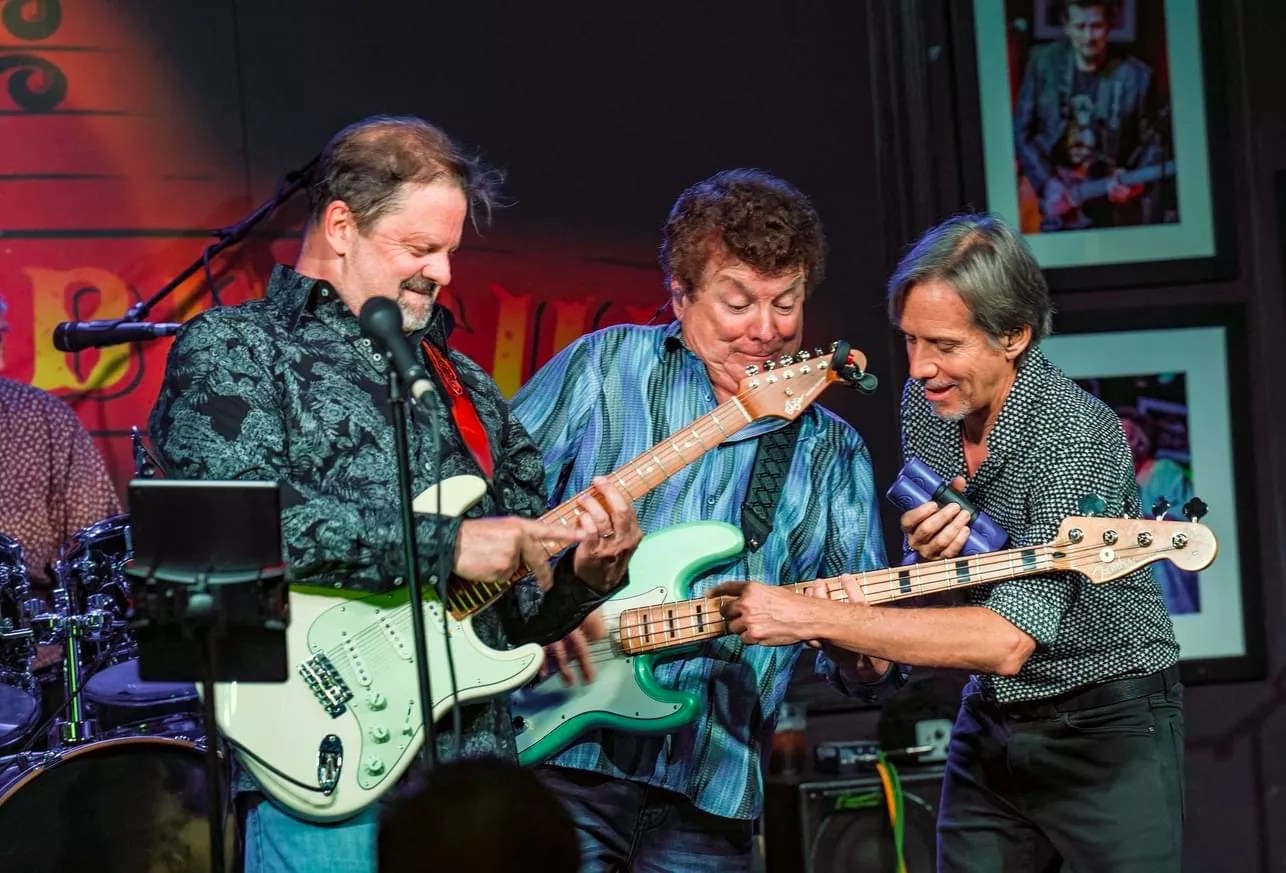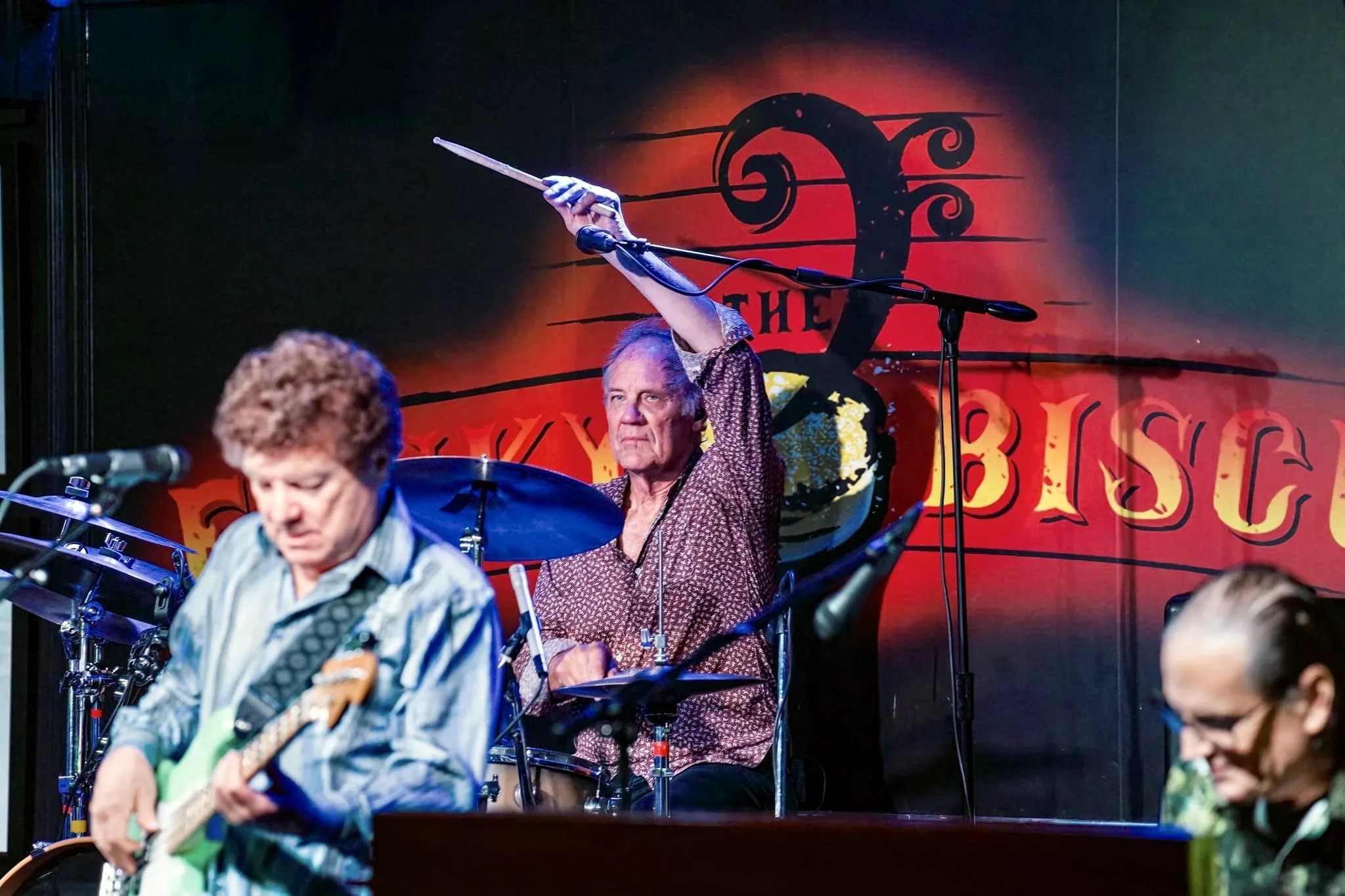
Chris Schmitt

Audio By Carbonatix
Legendary pop-rock band Ambrosia created a fifty-year legacy through various connections and moments of lucky happenstance. Back in 1970 in Los Angeles, recent high school graduates and former classmates Joe Puerta and David Pack pursued their dream of forming a band, collecting members through word of mouth and Rolodex contacts. That dream came true, but they never imagined they would still be playing five decades later.
On the hunt for a keyboard player, Puerta found Christopher North in a dimly lit backyard shed. “There was a coffin with speakers in it. And at the end of the room, Chris was there, playing the organ with a bottle of wine on the top…smoking a cigarette, and there was a girl massaging his shoulders as he played,” Puerta recalls. “So I go, ‘We gotta get this guy in the band.'”
With North on keys, Puerta on bass and Pack on guitar, all the band needed was a drummer. Puerta, Pack and North paid $5 to enter the Musician’s Contact Service in downtown Hollywood, where reams of musician names were organized by instrument. “So we see this name, and we go, ‘Oh, my God is this really a real name? Burleigh Drummond?'” Puerta says. The band set up a time to rehearse with Drummond, who was studying music at UCLA. “We had no money, so we’re rehearsing it in my folks’ living room,” Puerta remembers. “And my poor parents were huddled in the back bedroom trying to escape the sound because we were playing too loudly.”
By the end of the year, Ambrosia’s original lineup was solidified with Puerta, North, Pack and Drummond. The cherry on top was the band’s classic ’70s ride: a grape-purple VW van.
After playing around clubs for two years, Ambrosia was recognized by sound engineer Jim Gamble, who invented blue boards in the 1970s and went on to found Gamble Consoles. Gamble invited the band to play at the Hollywood Bowl when it was empty, using his cutting-edge sound system. “So on a Sunday afternoon, we brought all our terrible gear – we were so broke – to the Hollywood Bowl, set it up and they set up mics and the big system that we were gonna be playing through,” says Puerta.
After the demonstration, the chief recording engineer for Decca Classics, the late Gordon Parry, extended an open invitation for the bandmates to attend concerts at the Hollywood Bowl.
“We ended up at the Bowl about every night listening to all this incredible classical music, which really later influenced us and also led to some connections with people,” Puerta says. Ambrosia met notable classical figures, including composers Leonard Bernstein (who composed the music for West Side Story, among many other notable works), Lukas Foss and Zubin Mehta, the chief conductor for the L.A. Philharmonic.
Mehta invited Ambrosia to play the Hollywood Bowl in 1973 with the L.A. Philharmonic – this time with an audience. One audience member was M&M Records producer Steve Goldman, who liked what he heard and invited the band to audition for Herb Alpert, the famed bandleader and founder of A&M Records. “[Alpert’s] opinion of us was that our ideas were beyond our execution,” Puerta chuckles. “I think we were just too nervous to play well. But they gave us a little studio time. We did three songs.”
Those three songs captivated Freddie Piro, who got Ambrosia a deal with 20th Century Fox Records in 1975, catapulting the group into a prolific recording career. Amborsia’s self-titled debut album included the band’s first chart-topping single, “Holdin’ On to Yesterday,” which reached number one in Denver before any other city in the nation. Needless to say, Ambrosia has a soft spot for the Mile High City.

Joe Puerta, Burleigh Drummond and Christopher North.
Chris Schmitt
But Ambrosia’s foundation began to fracture in 1982, and the band went on hiatus. Pack started a solo career, and Puerta jumped between bands before joining Bruce Hornsby and The Range in 1984; he also road-tripped with Sheena Easton and Laura Branigan, appearing in Easton’s videos for ’80s hits “Strut” and “Sugar Walls.” When 1990 hit, former Ambrosia members began to play together again, and after The Range broke up in 1992, Puerta was free to rejoin the band of his teenage imaginings. “It was a slow build,” Puerta says. “We just started gradually rebuilding our market.”
Pack left the band for good in 2000 and was replaced by guitarist and Colorado native Doug Jackson. Jackson grew up playing jazz in Evergreen and attended the Berklee College of Music before moving to L.A. He played in an opening band for Ambrosia in ’89 and stayed on the band’s radar – the members had even called on Jackson to sub in the early ’90s, but he was sick and couldn’t take the gig.
Ambrosia still has three out of four original members – Puerta, North and Drummond have faithfully stayed since Ambrosia’s revival in the ’90s. Besides Jackson, the band has two other additions: Kipp Lennon on lead vocals and Mary Harris on keyboard and vocals.
Ambrosia’s music has aged like fine wine, keeping its groovy rock roots while folding in classical influences for an organic sound. Despite the increasing commercialization of today’s music industry, Puerta emphasizes that Ambrosia keeps its creation process simple. He says today’s music “is kinda like a formula, you know? It lacks a certain kind of organic quality, and I think that’s one of the things people sense and feel in the music from our era.”
Meanwhile, Puerta is looking forward to bringing those classic tunes back to Denver. “Emotionally, one of the biggest thrills of my life was when they broke into our little rehearsal hall and said, ‘Your record just went to number one in Denver,'” he says. “It blew our minds.”
Ambrosia, 8 p.m. Wednesday, July 26, Bluebird Theater, 3317 East Colfax Avenue. Tickets are $38.